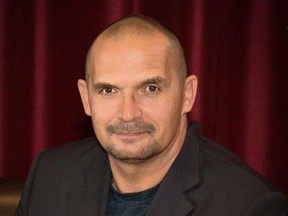
Article content
For a couple of decades, Anton (Tony) Kokol struggled to stay clean.
He had a wife and a career in the oil field, but due to his drug use (his drug of choice was cocaine), he lost everything and ended up homeless, living in crack houses and trying to support his addiction.
Article content
When he was around 40, he ended up in Bowden Penitentiary in 2006, serving two years in prison on charges of extortion and forcible confinement.
Advertisement 2
Article content
Prison turned out to be his salvation, said Kokol, now 61.
“Every day in prison I stayed clean and I was very determined to change my life, so when I got out I went to a (Calgary) treatment center,” said Kokol, who grew up in Red Deer and now lives in Calgary.
But even though he was driven to change his life, he relapsed and twice violated the conditions of his parole.
“But that is the nature of the disease. “It is prone to relapse and resistant to treatment, and I certainly experienced that.”
Once released from prison, things changed when he returned to the Calgary treatment centre.
“I decided to make all the changes that needed to be made, which basically consisted of leaving that old world behind and not going back to old friends and the old environment and going deeper into recovery.”
Since then, Kokol has worked for long-term residential treatment centers, most recently as an operations manager at a Lethbridge facility.
Kokol, who now works privately as a sober companion and coach, has been invited to speak at the Alberta Community Crime Prevention Association meeting. annual conference May 6-8 in Calgary.
Article content
Advertisement 3
Article content
Coming to terms with what he did was key to recovery, he says.
“Although it is a disease, you cannot be a victim of it and I cannot use it as an excuse. “I did a lot of damage and the responsibility falls on me to repair that damage and make peace with my family, my friends and the world around me.”
But I couldn’t have done it alone.
“It’s not easy, but the good thing about recovery is that you have people around you who have done it before and can show you the way, and you are surrounded by a positive environment and positive people who are on the same journey. .”
Kokol found that people are surprisingly forgiving and supportive if they see a person making an effort.
“Even when it came to banks, businessmen or employers, when I was honest with them, they were willing to give me a chance, especially if they see that you are trying and that you have some clean time. . “They are willing to work with you and take you at face value.”
Counselors, managers, a probation officer, and people who accompanied him in recovery played an important role in his recovery.
“My parents were also key, and it took them a while to recover after decades of disappointment and failed attempts. But after you stay clean for a while, they notice, they see that you’re trying, and they get back on the boat.”
Advertisement 4
Article content
When he was in prison, Kokol says he felt really defeated and needed help. And a treatment center offered it to him, providing him with a place to live, as well as clothing and food.
“I needed a pat on the back,” Kokol said. “I needed someone to hold me and tell me everything was okay.”
The philosophy behind the treatment has changed over the years and currently focuses on evidence-based, peer-supported ways of offering help to people in recovery, Kokol said. Patience, she added, is key.
“They’ve realized there’s no 30-day cure,” he says. “That went on for a long time, there was like a wash and rinse cycle with people with addictions doing these short-term treatments, and it doesn’t work. “It takes a while.”
Second-stage housing and supports now exist to help those recovering for years after starting treatment, Kokol said.
“Recovery is recovery in all areas of life, and that’s what they’re trying to address now.”
Despite hundreds of recovery attempts, the system never gave up and that’s something Kokol is grateful for. He is eager to convey that message in the Alberta Community Crime Prevention Association Conference.
“I’ve been able to really do a 180 and change my life and become productive and therefore be able to help people on that same journey,” he says.
“I can give you an idea, my perspective of my journey,” said Kokol, who will give a presentation called 180 Degrees. “I walked the other way and there is an exit.”
Article content
